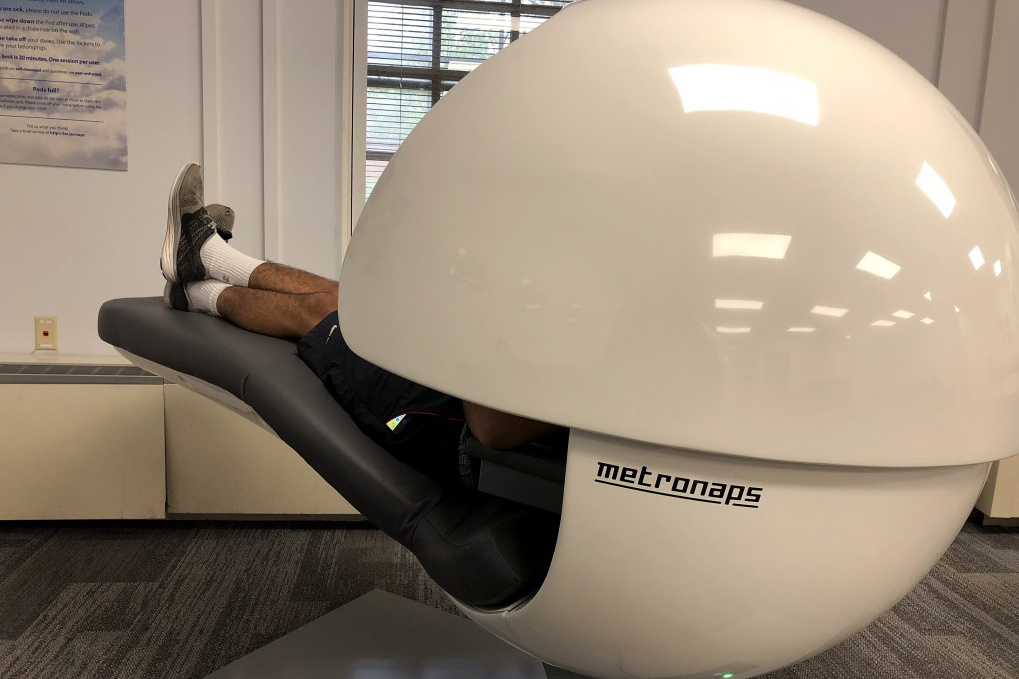When junior government and politics major Katie Krull walked into McKeldin Library on Thursday, she was initially a little confused by the presence of two large white pods.
“I was like ‘Why are there eggs in here?'” Krull said.
The $21,818 pods, intended to be used for napping, were installed in the library in the room to the right of Footnotes Cafe that afternoon. Each houses a reclining chair, a movable privacy visor, a 20-minute timer, a light that mimics sunrise at the end of a nap and speakers that play music when a nap begins and ends.
The pods were proposed as a solution to “student fatigue,” and to help commuters deal with the time and stress of traveling, said senior sociology major Anthony Escalante, who developed the proposal for the napping pods. Escalante suggested the idea to SGA representative Christian Coello, who proposed it to the association.
[Read more: “It’s hot as shit”: UMD students in dorms without AC have taken to sleeping in lounges]
Freshman chemistry major Chima Odoazu used one of the pods and said it helped him relieve some of the stress of his day.
“When the chair starts vibrating a little bit, it gets you in that relaxed state, and it was definitely hard to keep my eyes open,” he said.
The pods, which the SGA proposed and endoresed last fall, were paid for by the Student Facilities Fund, which is used for student-supported projects, improvements and facilities.
“Students have come to us for years seeking solutions to this common problem of sleep deprivation and fatigue,” University Libraries spokesperson Eric Bartheld said. “They’ve brought proposals to us for all kinds of things: a sleep room with cots, to check out pillows, all kinds of answers — and this is one that seemed to make sense.”
Graduate student Pranav Prabhu also liked the concept of the pods, but said they cost too much money.
“When I’m studying late at night and I have to take a quick power nap, I can relax in these,” he said. “But that’s really expensive, it’s not worth that.”
[Read more: $104 million demolition and reconstruction planned for part of UMD’s chemistry building]
Krull shared similar thoughts, saying the pods were too expensive for something she wouldn’t really use.
“While I think it’s nice for people who are commuting or don’t live on campus, in the general public there aren’t really those options, so I don’t see the necessity for it,” she said.
Escalante said the expense is worth it because the pods will help decrease stress and fatigue in students and therefore help their mental health.
He said other options were considered — such as rooms with cots or couches — but they didn’t provide students with private or sanitary sleeping spaces. The napping pods solve these problems, he said, because they have privacy visors and can be easily wiped down.
Odoazu said he thinks they can help solve the issue of stress and fatigue in students.
“Some students have really hard days and they need a minute to decompress, and I think these can do that,” he said.
The pods will be in testing until the end of the fall semester to see whether students like them, and an online survey will soon be released for students to record their thoughts on the pods. Library staff and Escalante will be monitoring their use.
If the pods prove to be effective, the library will consider adding more, Bartheld said. It’s unknown how many more pods could be added because of their high cost, he said. But if more pods are added, they are likely to also be placed in the library.
Accessing future pods might also require students to use their ID cards, which would limit them to two naps a day, to prevent students from abusing the pods or taking extra-long naps, Escalante said.
“If they’re popular, and we see what are some of the concerns that students bring up, we might consider adding more,” Escalante said.



